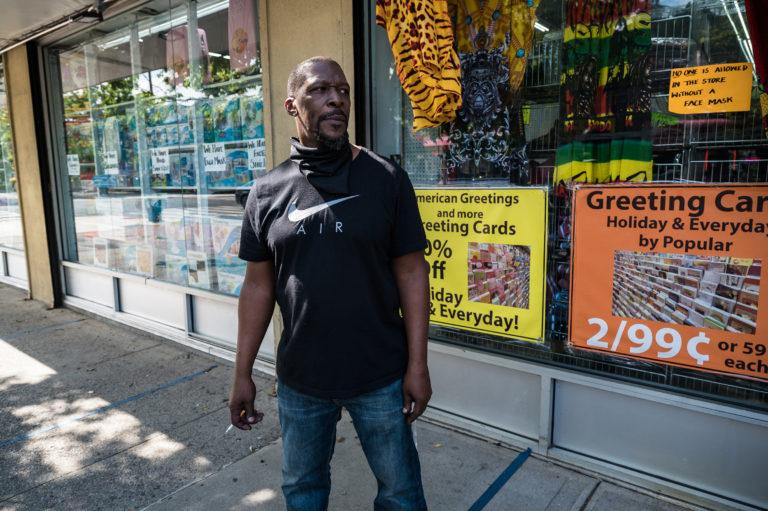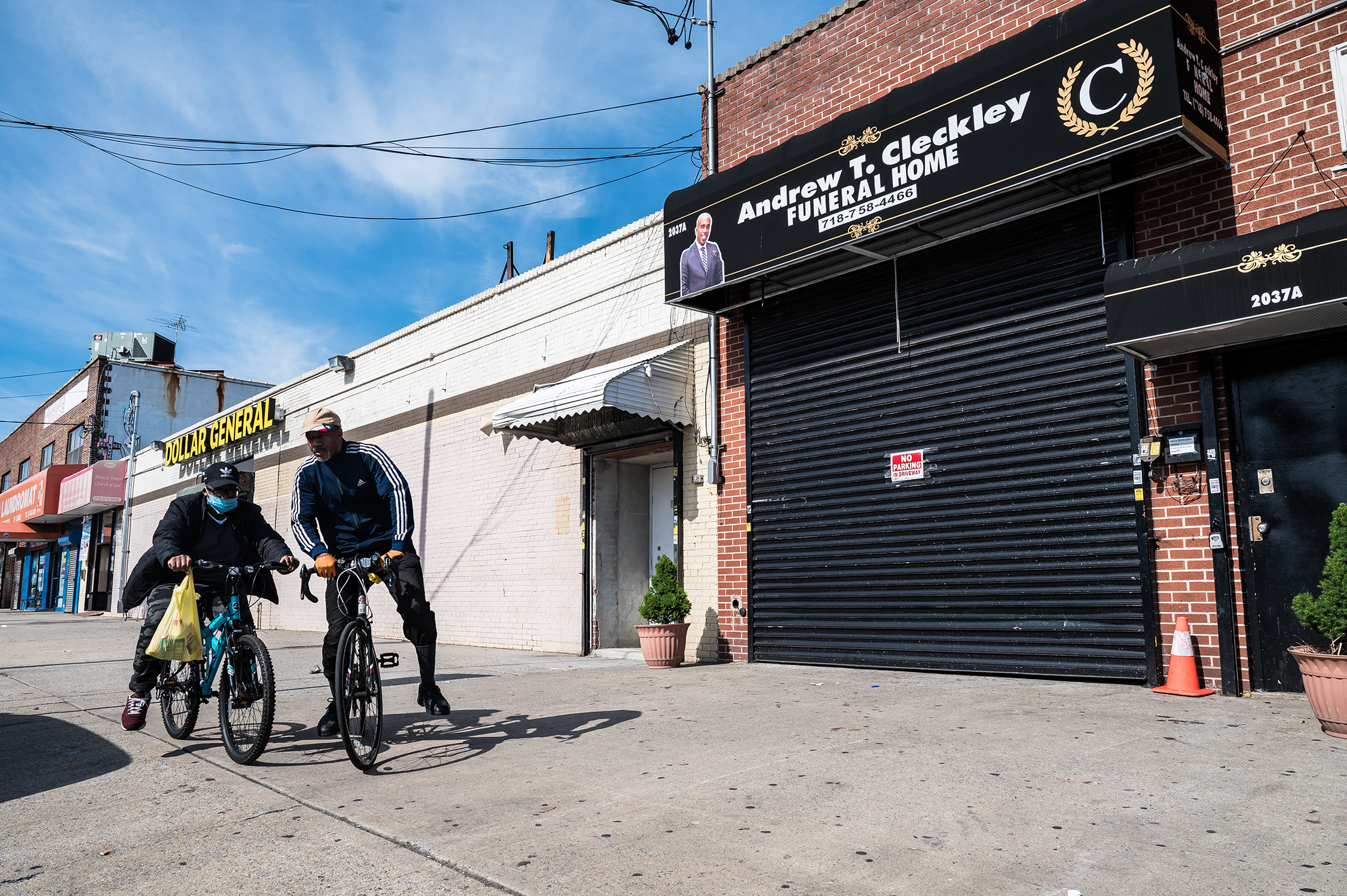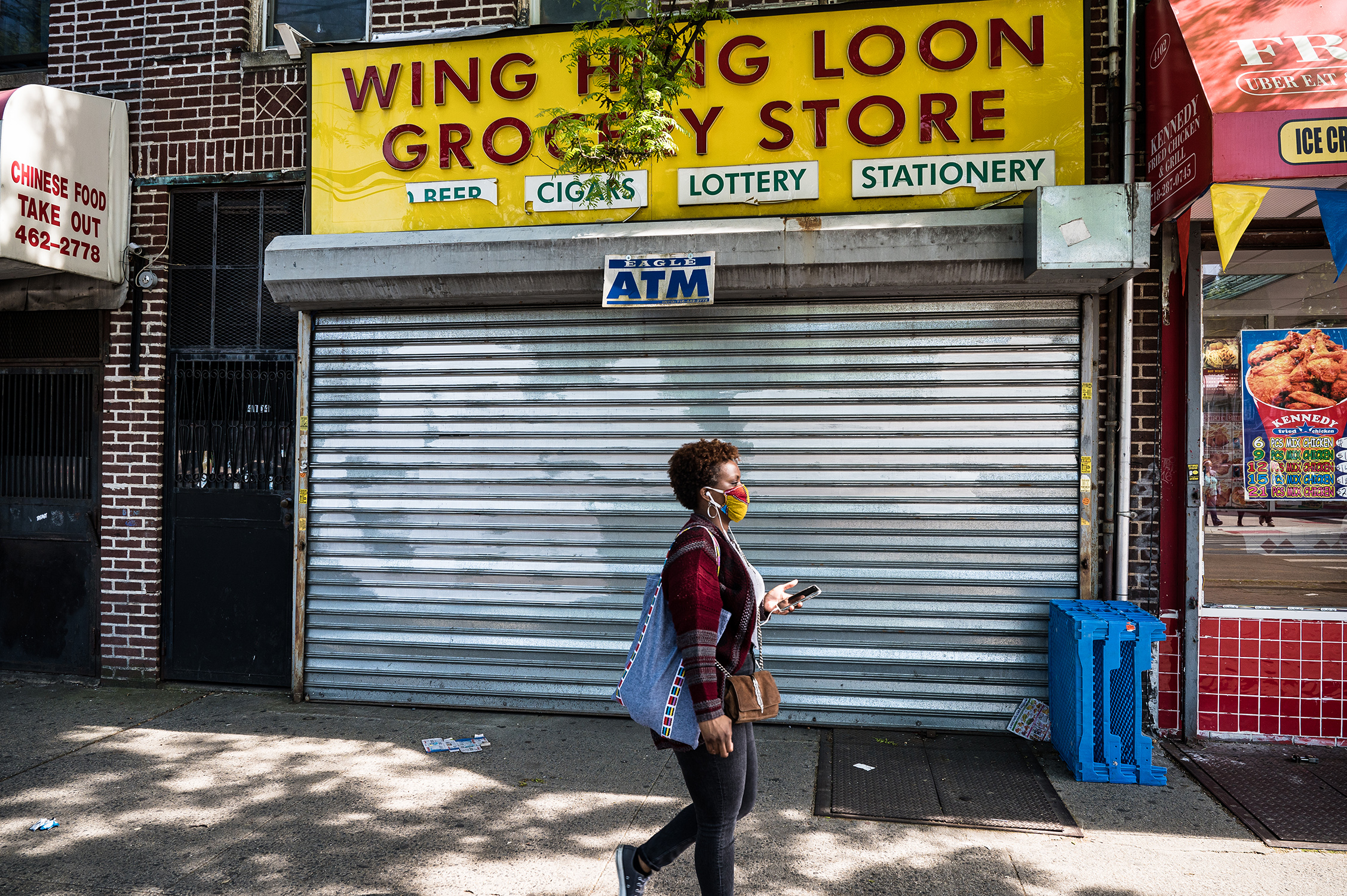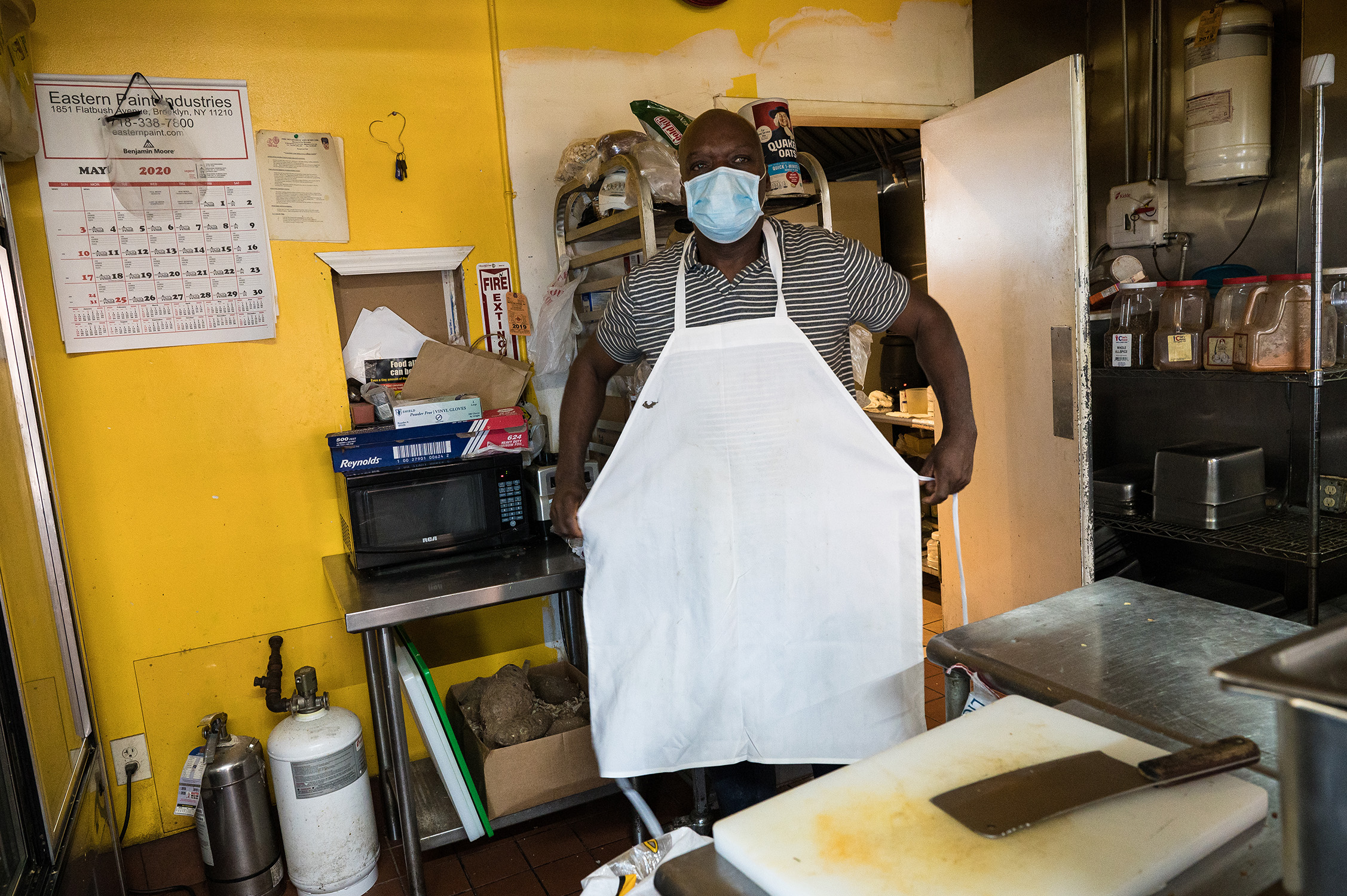In pandemic-ravaged Brooklyn, surviving is striving
The New York City borough, long a home to America’s strivers, became an epicentre of the pandemic. Will the place that forever reinvents itself ever be the same?

Of 63,000 small businesses in Brooklyn, one in three may never reopen; ‘I have to keep going,’ says Mack, manager at the K & S on Utica Ave (Photograph by Idris Talib Solomon)
Share
It was toward the end of April in the plague year 2020, on the flatland of outer Brooklyn, NY. Going about their daily business far from the brownstone wonderlands closer to Manhattan, folks coming out of the Utica Laundromat and the Dollar General and the Tu Bohío Dominican grocery began to notice a noxious odor emanating from a U-Haul that was parked against the curb at number 2037A Utica Ave.
It was the bouquet of death—the stench of a cord of human bodies stacked like firewood in the sun-baked, uncooled truck. The enterprise at 2037A was a funeral parlour licensed to a man named Andrew T. Cleckley; his picture was on the marquee. But after two months of rampaging infection, so many of the good people of Brooklyn had been conquered by COVID-19 that even Andrew Cleckley’s ablest embalmers weren’t nimble enough to unzip and wax and export all of them to Brooklyn’s cemeteries before the weather turned warm and they putrefied in their eternal sleeping bags and stank up the neighbourhood.
It was not only at poor Cleckley’s, of course, that the dead had overwhelmed the living. No place on this wounded planet had been stricken more devastatingly than the African-American and Caribbean and Hispanic districts of the Greatest City in the World, with their ethnic lunchrooms, bustling dollar marts, boarded-up failures, and hushed little chapels of grief. All across Brooklyn and the Bronx and Queens, orderlies had been forklifting bodies into rented vans and storing them in closets and corridors for weeks.
There were zip codes in Brooklyn where the rate of death was 30 times higher than in the wealthier, whiter zones. Utica Avenue was one of the worst affected. Out here, the dead were the strivers who, even as the great city’s elites Zoomed home in fear, still had to strap-hang the subways, crush the buses, restock the panic-stripped emporiums, cleanse the pathogenic countertops and comfort the brown-eyed great-grandmothers who, through no sin of their own but poverty, were gasping toward Jesus alone.
One of the decedents in the U-Haul truck may (or may not) have been the parent of a woman named Tamisha Covington, who told the New York Post that the coffin that came out of Cleckley’s was much too narrow to possibly contain the remains of her mom, who weighed in at 140 kg before the virus swept her and more than 20,000 other New Yorkers away.
“We don’t know what’s in that casket,” Covington said, pledging to find out what really happened in a macabre game of hide-and-seek. This was what underclass Brooklyn was like in the plague year of 2020.
The rotting corpses, the overwhelmed mortuaries, the forgotten poor—to venture here from Washington, costumed in melancholy and a mask, wasn’t just reporting. For me, it was going home.

It was sunny May on Utica Avenue. There was a battered Toyota Sienna in front of Cleckley’s, defiantly blocking a bus stop, the disgraced mortician’s driveway and a fire hydrant—fuggedaboudit, it’s Brooklyn. The rear seat had been removed and there was a catafalque on wheels in the hold, eager for COVID’s next cadaver.
A FedEx truck rolled up and the driver came out with an envelope and rammed it into Cleckley’s overflowing letterbox.
“Probably another lawsuit,” the FedEx man said.
A young woman named Gabrielle Smith was sitting on her stoop on Avenue M, sipping tea. She remembered smelling something unpleasant from the U-Haul and her shock at learning what it was. “We thought everything was done correctly over there,” she said. Smith believed that she might have taken a touch of the corona herself, back in March—chills, sore throat, coughing—but she hadn’t been tested and she hadn’t died, and in Brooklyn in 2020, that was a pretty good outcome.
“I never get sick like that,” Smith said.
“If there was a vaccine, would you take it?” I asked her.
“No,” she answered. “There are better things we can take for our health that come from the earth.”
“Is this God’s vengeance on New York City?”
“No. No. No,” the tea drinker replied. “Man made this. We have been manipulating nature in the laboratories and that is where this came from.
“Man made this.”
***
Long, long ago, a few blocks off Utica Avenue, there was a 10-stool soda fountain and newsstand to which three brothers, combat veterans all, gave the best decades of their lives, spending 10 hours a day on their feet, seven days a week, to clear maybe three hundred dollars a month. They were the Abel brothers—my father Ben, and George, his twin, and Davey—and now, with their store long since sold to newcomers from Korea, and with the Borough of Churches ravaged by disease, it was not a stretch to suggest that the corpses in the hallways and the U-Hauls of Brooklyn were not anonymous strangers.
They were our customers.
No fairy tale could match growing up in a Brooklyn candy store in the 1950s, of revelling in a private castle of comic books and Lady Borden ice cream, with my dad behind the counter in his apron, baseball on the radio, and the Yiddish-speaking cook we called “Pot Roast Willie” boiling beef tongue for the Special of the Day. But eventually, the Abel brothers of Brooklyn gave way to the Ding sisters of Beijing, and my sugary playhouse became the Wing Hing Loon (“Eternal Prosperity”) grocery and lottery stand, and the little boy grew grey.
(In the 1970s, after my parents divorced, my mother and her second husband went into the same unprofitable industry. One of their ventures was a little coffee shop on Utica Avenue, just down the boulevard from Cleckley’s, that in 2020 had been reborn as the Dominican grocery called Tu Bohío.)
Now, the Wing Hing Loon was shuttered, perhaps forever, its menacing grate a barricade between the morbid reality of the new Brooklyn and the remembered paradise of the old. (One in three of the borough’s 63,000 small businesses may never reopen, a charity called the Bring Back Brooklyn Fund calculated.) But across the street, in what had been Nat Birnbaum’s apothecary in another century, the avid crowds swarmed.

“I’ve got paper towels,” the manager of the K & S Department Store was merrily griping. “I’ve got toilet paper. I’ve got masks and gloves. I’ve got everything but the Big Kahuna.”
“What’s the Big Kahuna?” the little boy from the candy store wondered.
“Lysol!” laughed the manager, a hearty man named Mike Mack. “They tell me, ‘Maybe by Christmas.’ That will be a great Christmas present—‘Here you go, darling, I got you some Lysol.’ ”
Thirty and more years ago, Mike Mack’s house on Albany Avenue shared an alley and a backyard—fenced off today and abandoned to the weeds—with the Abel brothers’ luncheonette.
“Why has this happened to New York City?” I asked him.
“Number one,” he answered, speaking in capital letters, “PEOPLE DON’T LISTEN. I don’t care how high and mighty you are, people need to LISTEN.
“Number two, if you didn’t die in your sleep and you woke up this morning, PAY ATTENTION.”
There was a number three, as well: “CLOSED MOUTHS DON’T GET FED,” said Mike Mack, though it was hard to imagine his being silent in the face of extremity for very long.
“They don’t get Lysol, either,” I noted.
“The chain has been broken,” Mack said. “It took two months to break what took two years to build. It’s going to take a minute to fix it. We need to get back to work. If we don’t get back to work, we’re DONE.”
There were other links that never could be mended—Mack had lost his beloved cousin Kim, the family baker.
“Did you ever have carrot cake?” he sighed. “Her carrot cake could knock you out.” But it was the virus that had kayoed cousin Kim: “It took her quick, two days. She was kind of overweight and diabetic and had high blood pressure. They were trying to get medicine in her, but there wasn’t enough time.”
Mike Mack stood at the entrance to the K & S and, as a preventive against thievery, checked shoppers’ purses and their takeout lunches from the China Express across the street, which used to be the Behrens family’s German delicatessen.
“I have one daughter,” Mack said. “She gives me the spark. She keeps me going. When cousin Kim died, I realized that I have two sisters, I have no brothers, I have my daughter, I am the only man in the family.
“It all comes down to me,” he said, and it was difficult to tell through his mask but he may have been weeping. “I have to keep going, because it all comes down to me.”
***
The sign on the door of Barone’s Funeral Home on Avenue D said “No walk-ins.”
What could you do in Brooklyn now but laugh?
The flower shop next door to the magic candy store had become Kennedy Fried Chicken. Amici’s Pizza was Rowe’s Restaurant, serving Jamaican food. An 80-year-old Ukrainian named Semeon Zemovich had bought out Vito’s Shoe Repair and he was standing in the open doorway, just for something to do.
“If New York no come back, America dead,” Zemovich said.
There was a hearse in the driveway next to Barone’s and cars were idling along my beloved, broken, beautiful childhood street and mourners were blinking out into the sunlight. A block away, at St. Thérèse of Lisieux Roman Catholic Church, they were live-streaming a mass in Haitian kreyòl and I could hear the pious organ even through the bolted doors.
Dudley Rowe, successor to Amici’s, had come to Brooklyn from St. James Parish, Montego Bay, Jamaica. His restaurant was unlit but open—the chairs inverted on the long, communal tables, the steam cabinet bare at mid-morning, a few hot patties in a glassed display. Rowe reckoned that he had lost 80 per cent of his income, but he said, “The desire for staying is greater than the desire for giving up. If you give up, you lose everything. If you go on, there is always greener grass.”
“If I had to do it all over again,” said Dudley Rowe, “I’d own a liquor store.”

Scrubbing the syrup containers and the ice-cream scoops near midnight, washing the coffee cups before the pre-dawn opening, Ben Abel used to say the same thing. But the Abel brothers never had to survive COVID-19.
“I know six of my customers personally who passed away,” Dudley Rowe said. “One man, I let him run a tab, and he would pay me every two weeks. He died before he could pay!”
The deficit was $47, and there were people in Brooklyn in 2020 to whom $47 was a considerable amount of money.
“I know that, biblically, God visited plagues on men because of their behaviour,” Rowe philosophized, trying to make sense of the calamity. “I am not putting the blame for this on anyone. I could blame the governor, the mayor, the president—initially, they did not handle this in the proper way. There was too much politics. New York is the world city. When they saw it starting in China, they should have prepared. They should have known it would come here.”
It was too late now for should-haves, too early for greener grass. On the outer flanks of my Brooklyn, the most wretched winter in history had finally passed, leaving a lesson in the epidemiology of caring and the resilience of the human heart.
“When it just started, the first week when the city shut down, I decided that I was going to close,” said Dudley Rowe. “Then some folks called me from Kings County Hospital and asked me to donate food for them. I could not give up. I felt like a billion dollars.
“That’s the best feeling in the world. When there are people who need you.”
This article appears in print in the July 2020 issue of Maclean’s magazine with the headline, “Avenues of sorrow.” Subscribe to the monthly print magazine here.